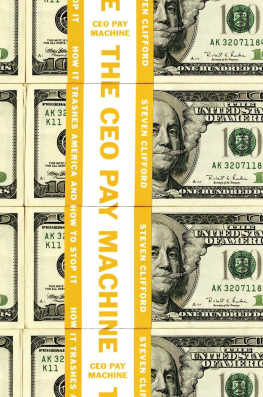Penguin supports copyright. Copyright fuels creativity, encourages diverse voices, promotes free speech, and creates a vibrant culture. Thank you for buying an authorized edition of this book and for complying with copyright laws by not reproducing, scanning, or distributing any part of it in any form without permission. You are supporting writers and allowing Penguin to continue to publish books for every reader.
Blue Rider Press is a registered trademark and its colophon is a trademark of Penguin Random House LLC
While the author has made every effort to provide accurate telephone numbers, Internet addresses, and other contact information at the time of publication, neither the publisher nor the author assumes any responsibility for errors, or for changes that occur after publication. Further, the publisher does not have any control over and does not assume any responsibility for author or third-party websites or their content.
CHAPTER ONE
Heresy
I started to question the standard CEO pay system in 2012 while I was a board member of a large family-owned business. The board accepted that CEO compensation must have three components: salary, short-term bonus, and long-term incentive. No board member asked why this trinity was holy. It would have been like asking why we worked in an office building or had an accounting department. It was how things were done.
The board was following a pay structure that expert compensation consultants had established ten years previously, along with a host of other pay practices, including peer groups, percentile ranking, compensation targets, performance measures, bonus targets, bonus ranges, and equity awards. The consultants argued that this system achieved pay for performance by linking CEO pay to the achievement of measurable goals. By 2012, virtually all large American companies used it to determine CEO pay.
The CEO pay process starts with the compensation (comp) committee of the board. At this family company, the comp committee established annual performance measures and goals for both the short-term bonus and the long-term incentive and measured the CEOs performance against them. Two-thirds of his bonus was based on financial measures and one-third on the achievement of nonfinancial goals.
I began to find annual nonfinancial goals problematic because important initiatives rarely fell neatly into a calendar year. If turning around a money-losing subsidiary was going to be a three-year struggle, what should be the measurable achievement for the first year? Hiring a new president for the subsidiary? Achieving a smaller loss? Drafting a good turnaround plan? When another board member actually proposed this, I objected. I can draft a good turnaround plan right now. My plan is to stop losing money. Do I get a bonus? The response was, Okay, wise guy, how would you measure the first years progress on a three-year turnaround? I had no good answer.
For the companys most important goals, what could be clearly defined and measured within a year was neither important nor revealing. One year, a major goal for the CEO was to hire a new chief financial officer (CFO). Offered a bonus for this achievement, should he get one for hiring his dog Buster as CFO? To prevent this, the board could specify that he get a bonus only if he hires a first-rate CFO, prompting the question: What is a first-rate CFO, and how can we tell if we have hired one?
Aggravating this lack of specificity, bonus measures were established before the start of the New Year, then often became obsolete after January 1 as the company faced unexpected opportunities or threats. One year, bonus goals were geared toward growth, but we suddenly had the chance to sell a large subsidiary at a great price and pay the shareholders a special dividend. The bonus goals now pushed in the wrong direction. Should we change goals? Perhaps, but unexpected events always happen. Should the company change bonus plans monthly? Daily?
I tried to imagine what would happen if the Pentagon drafted bonus plans in September 1942 for achievements in 1943. General George S. Pattons bonus might have depended on capturing particular towns in North Africa, while General Douglas MacArthur might have gotten one for protecting Australia from invasion. If we assume that bonuses influence behavior, MacArthur diverts resources from island-hopping to defending Australia, while Patton stays in North Africa and ignores the opportunity in Sicily. Or imagine structuring a set of bonus bogeys for General Dwight D. Eisenhower to motivate him to take the right actions when he was the Supreme Allied Commander.
If generals got bonuses for winning battles, they might be encouraged to fight easy, meaningless battles. To correct this, the military could award generals a bonus only after capturing at least a thousand enemy soldiers, but then generals might have an incentive to end the battle as soon as a thousand soldiers were captured, because they wouldnt get any extra pay for capturing more. But modifying the bonus criteria to remove these perverse incentives would inevitably introduce more unintended consequences.
This is a ridiculous analogy, you may think. Eisenhower was trying to win a war. He was concerned with soldiers lives, not money. He would do the right thing regardless of any bonus.
You are probably correct. But then why have a bonus system? A bonus system makes sense only if it changes peoples actions, decisions, and behavior. A bonus system that does not change behavior is a complete waste of money.
We recognize the absurdity of an annual bonus system for generals, but generals and CEOs face many of the same challenges. They command but must also lead and persuade. They face enemies (competitors), battle over territories (markets), introduce new weapons (products), coordinate their divisions, and make strategic decisions under conditions of uncertainty. Then why are annual bonuses absurd for a general but necessary for a CEO? Perhaps because the military trusts its officers, and in a strange way, corporations do not.
Duty, honor, country, MacArthur told the Corps of Cadets at West Point, those three hallowed words reverently dictate what you ought to be, what you can be, what you will be. The military believes that the strength of this commitment will guide officers to make the right decisions and take the proper actions without the financial reinforcement of duty bonuses, honor bonuses, and country bonuses. Corporate America implicitly fears that if CEOs are paid only a salary, they will neglect their responsibilities to shareholders. Therefore, a bonus system is necessary to animate CEOs actions, decisions, and behavior.
Remember that bonus systems are indefensible unless they change peoples actions. A company cannot justify a bonus for actions that would have occurred without it. The great irony is that CEO bonuses do change actions and decisions: they make CEOs more selfish and less aligned with the interests of the shareholders.
Corporate directors would bristle at the suggestion that they dont trust their CEOs and argue that they are paying for performance and therefore aligning the CEO and shareholders. But paying for performance assumes that the performance bonus will cause the CEO to act differently. In crude terms, the board holds that the CEO will make the shareholders more money only if he pockets his share of the loot. To get him to do the right thing, the board must bribe him. This does not exhibit a high level of trust.










